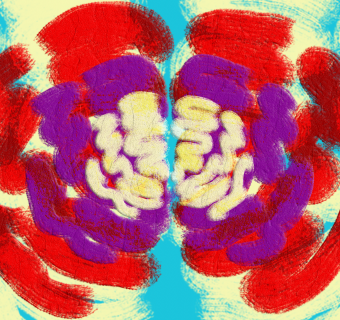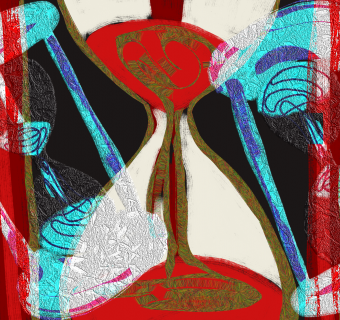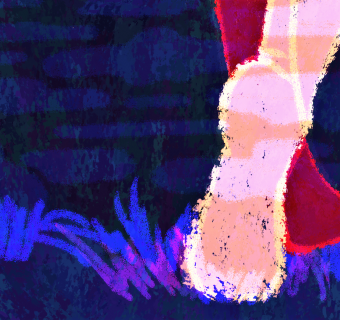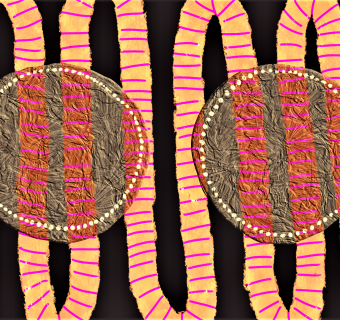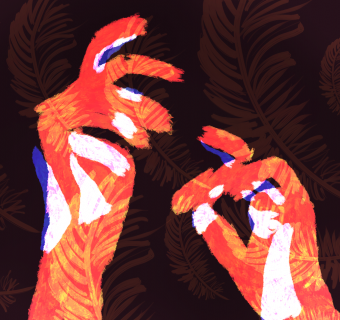A popular online study found that 54% of women would rather be hit by a car than be considered overweight. This essentially means that 54% of women would rather be hit by a car than look like me.
As sad as that sounds, what is far more disheartening is that for most of my life, I was one of those 54%. Plus-size, big, thick, curvy — whatever you call it, I am and have always been fat. Until around 7 years old, I didn’t know I was fat. And I was happy. I was a blonde-bobbed big ball of giggles. I ran around playing every sport I could, proudly donning the title of “queen of jail break” at elementary recess and “the impenetrable wall” as a goalie in soccer. I was proud of how my body moved, and though I might have been a bit slower than the other kids at recess, I never let a few extra pounds stop me. A tomboy in action but a girly girl in fashion, I wore zebra-print tops, neon pink skirts and bejeweled denim jackets; and as fashionably-inept as my Justice outfits were, I loved the way I look. Or at least I think I did. For most of my childhood, I never gave much thought to what I looked like or what people thought of me — until I learned what people really thought when they looked at me.
I started getting bullied in first grade. As much as I loved to be outside and play sports, I hated PE for one simple reason…the dreaded mile run. My weight combined with severe childhood asthma made me the slowest kid in the class, and my classmates were really quick to run to the conclusion that I’m “too fat to run”. Realistically I was not that much bigger than the 20 other average-sized kids in my class, but when you’re the tallest and heaviest in the class and also a girl, 7-year-old kids tend to notice. The teasing continued for years as kids called me a “big baby” and dared me to run after them at recess — inevitably resulting in an asthma attack. I couldn’t go a day without being reminded that I was fat, and I couldn’t go a day without wanting to change my body as a result.
With two knee surgeries and six bulging discs in my back, there were many days where I felt like I actually had been hit by a car — and let me tell you, I’d choose being overweight over that feeling any day.
I started my first diet when I was 9 years old. After a particularly unpleasant session with the doctor, my mom signed me up for Weight Watchers, and I HATED it. Being self-disciplined enough to track and measure everything you eat is already incredibly difficult, but when you’re too young to even spell discipline, it’s pure torture. So I would track my points and measure my carbs when my mom was watching — but at night, I would sneak downstairs after bedtime, move the dining room chair next to the pantry and climb my way to the upper cabinet where my parents hid the good snacks. Every day was fruits, veggies and calorie trackers, and every night was hoarding as many candies, chips, and granola bars as I could without making a sound…. Thus became the first of many failed diets.
The next seven years were spent going from one diet to the next. With the encouragement of my parents, I tried low carb, carb-free, only soup diet (not sure how I thought of that one), keto, vegetarian, gluten-free, but my body only grew. The line between diet and disorder became thinner and thinner but I did not. My efforts at “self improvement” were made much harder after a ski injury which left me unable to walk without assistance for nine months at 13 years old. With two knee surgeries and six bulging discs in my back, there were many days where I felt like I actually had been hit by a car — and let me tell you, I’d choose being overweight over that feeling any day. But as painful as movement was, I had to keep going. Physical therapy replaced soccer practice and my days were spent going from one doctor’s appointment to the next. As I learned to walk and function normally again, the doctors, my family and the kids in class still only seemed to care about my weight. I tried almost everything but I still couldn’t shrink down to the size they wanted me to be.
High school, when you don’t look like and can’t move like everyone else, was just as painful as a bad back or broken knee. I limped around campus as a 6 foot, 200+ pound girl with a hunched back and 32-inch knee brace. Although I had a string of what my mom called “fair-weather friends”, I wasn’t able to find a true friend who didn’t judge, criticize and gossip about me and my body. So while other kids played and partied on the weekends, I stayed home practicing my PT exercises and studying hard to go to a college where maybe — if I was lucky enough — I could find friends who’d see me as more than just fat. I eventually gave up on dieting; not because I finally accepted my weight, but because I became convinced that I couldn’t change it. And what else is working out and eating healthy for, if not to look better? Why starve myself and put my body in more pain just to still hate the way I look?
After years spent going to knee specialists, surgeons, GDs, nutritionists, physical therapists, etc., my parents grew tired of the endless search for an underlying diagnosis that they did not think existed. But I knew otherwise.
I lost the knee brace when I left for college. I could walk without limping or falling for the first time in years. And as wonderful as that felt, while my knee healed, my back pain only intensified. My parents attributed the pain to my weight — the six bulging disks were irrelevant in their eyes and losing weight was the cure-all fix to everything I felt. Don’t get me wrong, I adore my parents and they have fought (and still do) very hard to give me a healthy, happy life. But as much as I was judged for being fat, they were judged for failing to raise a “healthy” child. So when I told my well-intentioned mom and doting dad about my pain, insecurities, and struggles to find friends, my weight was something they could point to and say “this needs fixing” for me to be a normal kid again.
After years spent going to knee specialists, surgeons, GDs, nutritionists, physical therapists, etc., my parents grew tired of the endless search for an underlying diagnosis that they did not think existed. But I knew otherwise. So three years ago, I added one last doctor to my seemingly never ending list — a rheumatologist who changed my life.
As I entered yet another waiting room with nothing to do but skim Highlights magazines and watch a rerun from an outdated game show, I had no expectations that this appointment would be any different. I’d have a nurse take my weight and height, wait an hour for the doc while my feet dangle from the exam table, and then finally see a doctor who would tell me nothing’s wrong with me except my BMI. But this was no ordinary doctor. A thirty-year-old MD now running her father’s practice, Dr. Buchfeurer personally escorted me to her office with a diagnosis and treatment options in hand.
But for the first time in my life, a doctor told me that losing weight should not be my priority, and that my health goes beyond the way I look. I was given a reason to try again.
She had me take a comprehensive blood panel before my first appointment and within seconds of our meeting, she diagnosed me with Amplified Pain Syndrome — a side effect of tolerating chronic pain from my back injury without seeking treatment. She told me I was a strong kid for putting up with the pain all these years and encouraged me to seek both group therapy for teens with chronic pain and medical treatment to ease my symptoms. But what she said next was far more impactful than her medical validation. Dr. Buchfuhrer told me that she did not care about my weight and that working out would help me feel better and help my body grow stronger.
Exercise without the intention of losing weight?? As simple as the idea was, after years of trying desperately to lose weight, I had never considered the value of exercise beyond weight loss. But for the first time in my life, a doctor told me that losing weight should not be my priority, and that my health goes beyond the way I look. I was given a reason to try again.
My apartment has a small gym on the first floor — three treadmills, a set of weights, and two exercise machines — but enough to get me started. After years in physical therapy and recovery training, I had avoided the gym out of fear of worsening my injuries, but Dr. Buhfeurer cured this problem too. She told me to avoid any exercises that cause pain but persist through discomfort and even prescribed me an exercise regimen: “10,000 dead bugs”, where I lay on my back with legs and arms raised high, and touch my opposite arm and leg to the ground. I now go to the gym 4 times a week with 60 dead bugs each session — I imagine I’m getting close to that 10,000 mark. I have not lost weight; instead, the number on the scale continues to go up as I grow muscles I never knew existed before.
My journey towards self-love is far from over, but being part of such a supportive group of women dedicated to body positivity has helped me to appreciate how far I have come.
As my body grows stronger, I am able to embrace movement again. I see the beauty and worthiness in a body that moves, and I have found friends who see me as worthy too. Last year, I joined the Women’s Center Body Positive Team. A community of people willing to accept me and care about me at any size — I didn’t even know it was possible as a kid but now I am so incredibly grateful to have found it. My second-year roommate, Lauren, shared her experience as part of this team and encouraged me to join. Just knowing that she accepts people of all shapes and sizes made me feel comfortable and seen. We are still roommates to this day, and she is now one of my closest friends.
As a member of the incredible Body Positive team, I was able to provide support and share my story of finding strength in a body I once hated to many other young women who have struggled to accept their inner and outer beauty. My journey towards self-love is far from over, but being part of such a supportive group of women dedicated to body positivity has helped me to appreciate how far I have come.
For most of my life, losing weight has been all I’ve wanted. To be skinny and beautiful and happy — if I could just lose weight, the rest would come along with it. I didn’t have to lose the weight to find the flaws in my logic. Skinny or not, I am beautiful. I am still that blonde bobbed giggly goofball but with a few extra inches, many extra pounds and ten years spent learning that I had it right the first time…I deserve to love myself. I am fat, but I am also beautiful, smart, compassionate, confident, and stronger than anyone who looks at me with judgment will ever know.



